Ditapis dengan

Open data in developing economies :toward building an evidence base on what w…
Recent years have witnessed considerable speculation about the potential of open data to bring about wide-scale transformation. The bulk of existing evidence about the impact of open data, however, focuses on high-income countries. Much less is known about open data’s role and value in low- and middle-income countries, and more generally about its possible contributions to economic and social…
- Edisi
- -
- ISBN/ISSN
- 9781928331599
- Deskripsi Fisik
- v, 275p. : ill.
- Judul Seri
- -
- No. Panggil
- 352.38091724 VER o

ethics of educational healthcare placements in low and middle income countries
This book examines the current state of elective placements of medical undergraduate students in developing countries and their impact on health care education at home. Drawing from a recent case study of volunteer deployment in Uganda, the authors provide an in-depth evaluation of the impacts on the students themselves and the learning outcomes associated with placements in low resource settin…
- Edisi
- -
- ISBN/ISSN
- 9783319483627
- Deskripsi Fisik
- -
- Judul Seri
- -
- No. Panggil
- 370 AHM t

Workers, managers, productivity :Kaizen in developing countries
This open access book provides a glimpse into the Japanese management technique known as “Kaizen,” and the ways it has been disseminated around the developing world. The novelty of this book is three-fold: it provides a contextualized view of the mechanisms of initiatives implementing Kaizen in developing countries; compared with productivity studies, it places the relationship between work…
- Edisi
- -
- ISBN/ISSN
- 9789811503641
- Deskripsi Fisik
- xxvi, 327p. : ill.
- Judul Seri
- -
- No. Panggil
- 658.406 WOR w
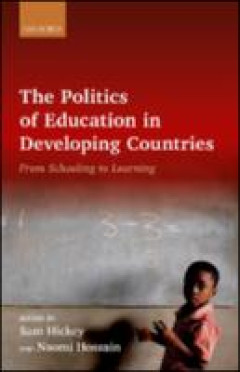
Politics of education in developing countries from schooling to learning
This book examines the politics of the learning crisis in the global South, where learning outcomes have stagnated or worsened, despite progress towards Universal Primary Education since the 1990s. Comparative analysis of education reform in Bangladesh, Cambodia, Ghana, Rwanda, South Africa, and Uganda highlights systemic failure on the frontline of education service delivery, driven by deeper …
- Edisi
- -
- ISBN/ISSN
- 9780198835684
- Deskripsi Fisik
- 256 p.; 22 cm.
- Judul Seri
- -
- No. Panggil
- 379 POL p
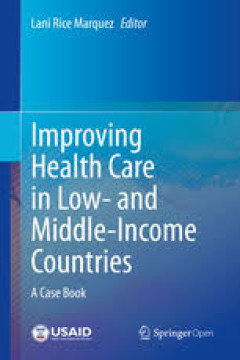
Improving health Care in low- and middle-income countries
This open access book is a collection of 12 case studies capturing decades of experience improving health care and outcomes in low- and middle-income countries. Each case study is written by healthcare managers and providers who have implemented health improvement projects using quality improvement methodology, with analysis from global health experts on the practical application of improvement…
- Edisi
- -
- ISBN/ISSN
- 9783030431129
- Deskripsi Fisik
- -
- Judul Seri
- -
- No. Panggil
- 610.73072 IMP i

Improving health Care in low- and middle-income countries
This open access book is a collection of 12 case studies capturing decades of experience improving health care and outcomes in low- and middle-income countries. Each case study is written by healthcare managers and providers who have implemented health improvement projects using quality improvement methodology, with analysis from global health experts on the practical application of improvement…
- Edisi
- -
- ISBN/ISSN
- 9783030431129
- Deskripsi Fisik
- -
- Judul Seri
- -
- No. Panggil
- 610.73072 IMP i

The ethics of educational healthcare placements in low and middle income coun…
This book examines the current state of elective placements of medical undergraduate students in developing countries and their impact on health care education at home. Drawing from a recent case study of volunteer deployment in Uganda, the authors provide an in-depth evaluation of the impacts on the students themselves and the learning outcomes associated with placements in low resource settin…
- Edisi
- -
- ISBN/ISSN
- 9783319483634
- Deskripsi Fisik
- xi, 158p. : ill.
- Judul Seri
- -
- No. Panggil
- 610.71 AHM e
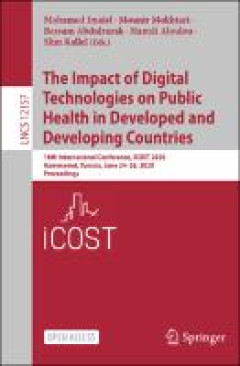
The Impact of digital technologies on public health in developed and developi…
This open access book constitutes the refereed proceedings of the 18th International Conference on String Processing and Information Retrieval, ICOST 2020, held in Hammamet, Tunisia, in June 2020.* The 17 full papers and 23 short papers presented in this volume were carefully reviewed and selected from 49 submissions. They cover topics such as: IoT and AI solutions for e-health; biomedical and …
- Edisi
- -
- ISBN/ISSN
- 9783030515171
- Deskripsi Fisik
- 442 p.; 22 cm.
- Judul Seri
- -
- No. Panggil
- 384.648 IMP i

Finishing global farm trade Reform:implications for developing countries
This study reviews policy developments in recent years and, in the light of that, explores ways in which further consensus might be reached among WTO members to reduce farm trade distortions — and thereby also progress the multilateral trade reform agenda. Particular attention is given to ways that would boost well-being in developing countries, especially for those food-insecure households s…
- Edisi
- -
- ISBN/ISSN
- 9781925261356
- Deskripsi Fisik
- -
- Judul Seri
- -
- No. Panggil
- 338.91 AND f

Early childhood policies and systems in eight countries:findings from IEA's e…
Educational policy; Early childhood systems; Aims of early childhood education; Education reform
- Edisi
- -
- ISBN/ISSN
- 9783319398471
- Deskripsi Fisik
- -
- Judul Seri
- -
- No. Panggil
- 372.21 BER e
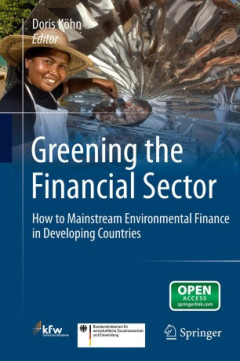
Greening the financial sector :how to mainstream environmental finance in dev…
Given the manifold challenges of financial sectors in developing and transition countries, one might be tempted to believe that embarking on “green” finance is not a priority for financial systems development. However, there are a number of arguments against this view. Environmental finance, particularly energy efficiency and renewable energy (EERE) finance, can and should serve as an inter…
- Edisi
- -
- ISBN/ISSN
- 9783642050879
- Deskripsi Fisik
- xiv, 249p. : ill.
- Judul Seri
- -
- No. Panggil
- 332.1 GRE g

COVID-19 in the global South :impacts and responses
"Available Open Access under CC-BY-NC-ND licence. Bringing together a range of experts across various sectors, this important volume explores some of the key issues that have arisen in the Global South with the COVID-19 pandemic. Situating the worldwide health crisis within broader processes of globalisation, the book investigates implications for development and gender, as well as the effects …
- Edisi
- -
- ISBN/ISSN
- 9781529217278
- Deskripsi Fisik
- XXI, 195 p.
- Judul Seri
- -
- No. Panggil
- 330.9 COV c

Improving a country’s education :PISA 2018 results in 10 countries
This open access book compares and contrasts the results of international student assessments in ten countries. The OECD’s Programme for International Student Assessment (PISA) released the results of its 2018 assessment in December 2019. This book reflects the debates that typically follow the release of these results and focuses on the causes of differences between countries. Such causes in…
- Edisi
- -
- ISBN/ISSN
- 9783030590314
- Deskripsi Fisik
- xiv, 263p. : ill.
- Judul Seri
- -
- No. Panggil
- 371 IMP i
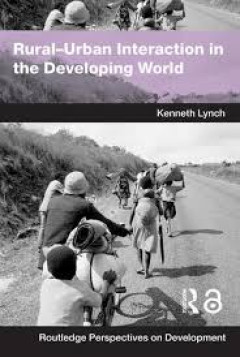
Rural-urban interaction in the developing world
Sustaining the rural and urban populations of the developing world has been identified as a key global challenge for the twenty-first century. Rural-Urban Interaction in the Developing World is an introduction to the relationships between rural and urban places in the developing world and shows that not all their aspects are as obvious as migration from country to city. There is now a growing r…
- Edisi
- -
- ISBN/ISSN
- 9780203646274
- Deskripsi Fisik
- xii, 209 p. : ill. ; 25 cm.
- Judul Seri
- -
- No. Panggil
- 307.14091724 LYN r
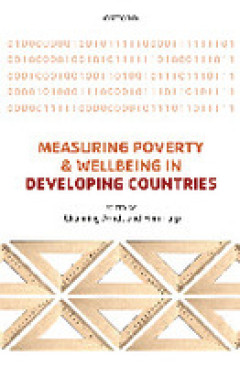
Measuring poverty and wellbeing in developing countries
Detailed analyses of poverty and wellbeing in developing countries, based on household surveys, have been ongoing for more than three decades. The large majority of developing countries now regularly conduct a variety of household surveys, and their information base with respect to poverty and wellbeing has improved dramatically. Nevertheless, appropriate measurement of poverty remains complex …
- Edisi
- -
- ISBN/ISSN
- 9780198744801
- Deskripsi Fisik
- xxiv, 347 pages : ill, maps ; 24 cm.
- Judul Seri
- -
- No. Panggil
- 362.5091724 MEA m
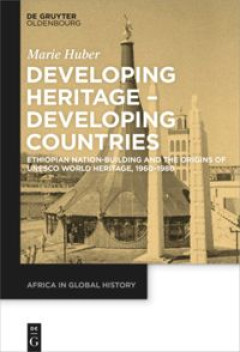
Developing heritage - developing countries :Ethiopian nation-building and the…
The history of development has paid only little attention to cultural projects. This book looks at the development politics that shaped the UNESCO World Heritage programme, with a case study of Ethiopian World Heritage sites from the 1960s to the 1980s. In a large-scale conservation and tourism planning project, selected sites were set up and promoted as images of the Ethiopian nation. This sto…
- Edisi
- -
- ISBN/ISSN
- 9783110681017
- Deskripsi Fisik
- XII, 204 p.
- Judul Seri
- -
- No. Panggil
- 963 HUB d

Structural transformation in South Africa :the challenges of inclusive indust…
Taking South Africa as an important case study of the challenges of structural transformation, the book offers a new micro-meso level framework and evidence linking country-specific and global dynamics of change, with a focus on the current challenges and opportunities faced by middle-income countries. Detailed analyses of industry groupings and interests in South Africa reveal the complex set …
- Edisi
- -
- ISBN/ISSN
- 9780192894311
- Deskripsi Fisik
- xxvii, 382 p.; ill
- Judul Seri
- -
- No. Panggil
- 338.968 STR s
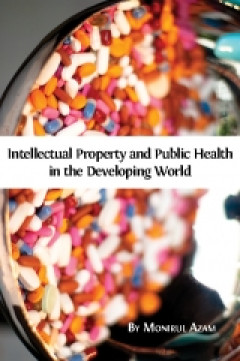
Intellectual property and public health in the developing world
Across the world, developing countries are attempting to balance the international standards of intellectual property concerning pharmaceutical patents against the urgent need for accessible and affordable medicines. In this timely and necessary book, Monirul Azam examines the attempts of several developing countries to walk this fine line. He evaluates the experiences of Brazil, China, India, …
- Edisi
- -
- ISBN/ISSN
- 9781783742301
- Deskripsi Fisik
- xxiiii, 348 p. : ill.
- Judul Seri
- -
- No. Panggil
- 615.1091724 AZA i

The political economy of bank regulation in developing countries :risk and re…
Why do governments in some developing countries implement international standards, while others do not? Focusing on the politics of bank regulation, this book develops a new framework to explain regulatory interdependence between countries in the core and the periphery of the global financial system. Drawing on in-depth analysis of eleven countries across Africa, Asia, and Latin America, it sho…
- Edisi
- -
- ISBN/ISSN
- 9780198841999
- Deskripsi Fisik
- xvii, 386 p. : ill.
- Judul Seri
- -
- No. Panggil
- 332.1091724 JON t
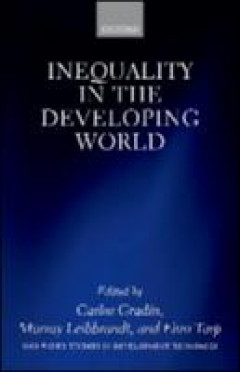
Inequality in the developing world
Inequality has emerged as a key development challenge. It holds implications for economic growth and redistribution and translates into power asymmetries that can endanger human rights, create conflict, and embed social exclusion and chronic poverty. For these reasons, it underpins intense public and academic debates and has become a dominant policy concern within many countries and in all mult…
- Edisi
- -
- ISBN/ISSN
- 9780198863960
- Deskripsi Fisik
- xx, 352 p. : ill.
- Judul Seri
- -
- No. Panggil
- 330.91724 TAR i
 Karya Umum
Karya Umum  Filsafat
Filsafat  Agama
Agama  Ilmu-ilmu Sosial
Ilmu-ilmu Sosial  Bahasa
Bahasa  Ilmu-ilmu Murni
Ilmu-ilmu Murni  Ilmu-ilmu Terapan
Ilmu-ilmu Terapan  Kesenian, Hiburan, dan Olahraga
Kesenian, Hiburan, dan Olahraga  Kesusastraan
Kesusastraan  Geografi dan Sejarah
Geografi dan Sejarah